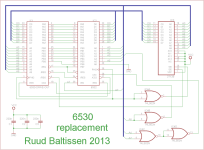Wreck
Member
After a rather long absence, I have a bit more time at hand presently, and I am spending it to learn a bit more about electronics & old computers.
I have a couple of 3032s & one 2001 (all working). Recently I had the opportunity to acquire two disk drives; one being a CBM3040 which was sold as "defect".
Below is a first "shot" at what I am doing at the moment; I think all the power supply to the relevant parts is OK, as far as I can see.
I will keep you updated on the progress; if you have any idea or further input, I would really appreciate
Joe
I have a couple of 3032s & one 2001 (all working). Recently I had the opportunity to acquire two disk drives; one being a CBM3040 which was sold as "defect".
Below is a first "shot" at what I am doing at the moment; I think all the power supply to the relevant parts is OK, as far as I can see.
- Functioning CBM 3032 with BASIC 2
- IEEE Test BASIC PRG performed; „end of test“ displayed, no failure message.
- CBM 3040 opened, checked GND connection of board to case.
- Power ON; VR1 & VR2 U/S, replaced, now good readings of +12V at CR7 / CR8.
- Voltage readings P6
- PIN1 +5.14V
- PIN2 GND
- PIN3 +12.05VA
- PIN4 GND
- PIN5 +11.98VB
- Behavior of drive;
- PWR ON, all three LEDs stay RED
- Both drives spin up but wont stop
- Sometimes the stepper motor drives the heads „home“ to the stop
- When entering, on the CBM, the command „LOAD$“,8,1 the message „searching for $“ appears but stays on until shutting down the CBM3040. Then the message „loading“ appears. This can be interrupted with the RUN STOP button.
- Voltage reading P1 (floppy analogue board)
- PIN13 +12VA
- PIN14 GND
- Voltage reading P8
- PIN13 +11.96VB
- PIN14 GND
- 6502
- PIN1 (VSS)
- PIN2 (RDY) HI
- PIN3 (CLK1) YES
- PIN4 (IRQ) HI
- PIN6 (NMI) HI
- PIN7 (SYNC) LO
- PIN8 +5.13V
- PIN40 (RST) LO then HI after PWR UP
- 6532 (UE1)
- PIN20 +5.11V
- 6532 (UC1)
- PIN20 +5.11V
- 6522 (UM3)
- PIN20 +5.12V
- 6530 (UK3)
- PIN20 +5.12V
- 901467(UK5, DOS1.0)
- PIN24(VCC) +5.10V
- 901468-06(UL1, DOS1.0)
- PIN24(VCC) +5.11V
- 901468-07(UH1, DOS1.0)
- PIN24(VCC) +5.12V
- 6504
- PIN4(VCC) +5.10V
I will keep you updated on the progress; if you have any idea or further input, I would really appreciate
Joe

